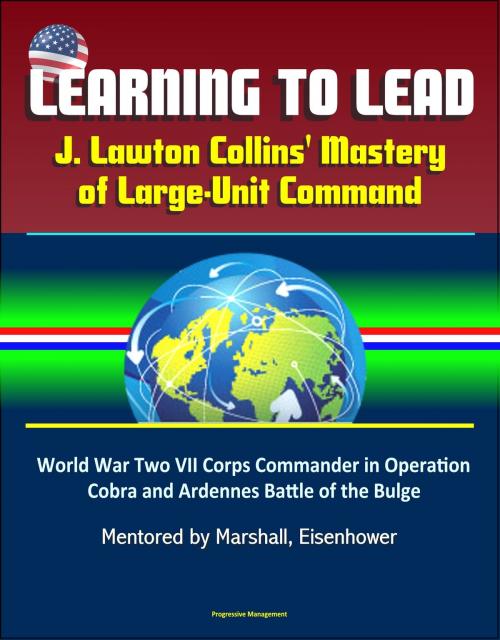Learning to Lead: J. Lawton Collins' Mastery of Large-Unit Command – World War Two VII Corps Commander in Operation Cobra and Ardennes Battle of the Bulge, Mentored by Marshall, Eisenhower
Nonfiction, History, Military, United States, World War II| Author: | Progressive Management | ISBN: | 9781370683680 |
| Publisher: | Progressive Management | Publication: | February 17, 2017 |
| Imprint: | Smashwords Edition | Language: | English |
| Author: | Progressive Management |
| ISBN: | 9781370683680 |
| Publisher: | Progressive Management |
| Publication: | February 17, 2017 |
| Imprint: | Smashwords Edition |
| Language: | English |
This excellent report has been professionally converted for accurate flowing-text e-book format reproduction. This monograph outlines a portrait of J. Lawton Collins' career to determine what common factors prepared him for becoming an effective large-unit commander. The goal is to illustrate the importance of professional military education, mentorship from senior leaders, and leadership experiences with the training and development of large-unit/operational level commanders. This monograph accomplishes this by examining factors such as Collins' extended service in the interwar US Army school system, mentorship from George Marshall, Dwight Eisenhower, and Omar Bradley, and combat command experiences during the Guadalcanal Campaign, and the capture of Cherbourg. Upon completion of the following events, it becomes evident that Collins masters commanding large-units in combat. This monograph further illustrates this evidence through Collins' actions and decisions while commanding VII Corps during Operation Cobra, and in the Ardennes during the Battle of the Bulge. By determining how Collins compiled and progressed the necessary skills to become an effective large-unit commander, this research promotes how the contemporary US Army can implement similar systems or approaches with developing its operational level leaders.
1. Introduction * 2. The Garrison Classroom: Collins' Interwar Education and Leadership Development * US Army Infantry and Field Artillery Schools * Instructor at the US Army Infantry School * Command and General Staff School * Army Industrial and War Colleges * 3. The Battlefield Classroom: Collins' Large-Unit Combat Command Development * Guadalcanal Offensive * Capture of Cherbourg * 4. Battlefield Genius: Collins' Mastery of Large-Unit Command * Operation Cobra "Breakthrough" * Ardennes Counterattack * 5. Conclusion * Implications * Appendix: J. Lawton Collins Biographical Timeline
On December 24, 1944, Major General J. Lawton Collins ordered a risky attack that violated the intent of his most recent orders. As the German army advanced against Allied forces through the Ardennes, British Field Marshall Bernard L. Montgomery ordered Collins' VII Corps to "go on the defensive with the objective of stabilizing the [southern] flank of the First United States (US) Army." However, recent reports from Collins' western most subordinate unit, Major General (MG) Ernest N. Harmon's 2nd Armored Division, reported that elements of the 2nd Panzer Division were stalled in a wooded area near the town of Celles and apparently short of fuel. Despite Montgomery's order to defend the area, he had not explicitly forbid attacking— though the intent of his orders were clear. Nevertheless, as Collins studied the enemy situation, he thought of a lecture he presented on the First Battle of the Marne while serving as an instructor at the US Army Infantry School seventeen years earlier. This lecture analyzed the actions of a German field army commander, who chose to follow orders to withdraw rather than exploiting French weakness by attacking. This failure led to a French victory in one of World War I's most decisive battles.
Guided by his understanding of military history, intuition, and a sound estimate of the situation, Collins identified the vulnerability of the 2nd Panzer Division and decided to attack without waiting for Montgomery's approval. By directing Harmon's 2nd Armored Division to counterattack near Celles, VII Corps nearly annihilated the 2nd Panzer Division, halting the German advance towards the Meuse River, and contributing to their eventual defeat in the Battle of the Bulge. With his bold actions in the Ardennes, "Collins had staked out a reputation as . . . perhaps the most effective [large-unit] commander in the European theater."
This excellent report has been professionally converted for accurate flowing-text e-book format reproduction. This monograph outlines a portrait of J. Lawton Collins' career to determine what common factors prepared him for becoming an effective large-unit commander. The goal is to illustrate the importance of professional military education, mentorship from senior leaders, and leadership experiences with the training and development of large-unit/operational level commanders. This monograph accomplishes this by examining factors such as Collins' extended service in the interwar US Army school system, mentorship from George Marshall, Dwight Eisenhower, and Omar Bradley, and combat command experiences during the Guadalcanal Campaign, and the capture of Cherbourg. Upon completion of the following events, it becomes evident that Collins masters commanding large-units in combat. This monograph further illustrates this evidence through Collins' actions and decisions while commanding VII Corps during Operation Cobra, and in the Ardennes during the Battle of the Bulge. By determining how Collins compiled and progressed the necessary skills to become an effective large-unit commander, this research promotes how the contemporary US Army can implement similar systems or approaches with developing its operational level leaders.
1. Introduction * 2. The Garrison Classroom: Collins' Interwar Education and Leadership Development * US Army Infantry and Field Artillery Schools * Instructor at the US Army Infantry School * Command and General Staff School * Army Industrial and War Colleges * 3. The Battlefield Classroom: Collins' Large-Unit Combat Command Development * Guadalcanal Offensive * Capture of Cherbourg * 4. Battlefield Genius: Collins' Mastery of Large-Unit Command * Operation Cobra "Breakthrough" * Ardennes Counterattack * 5. Conclusion * Implications * Appendix: J. Lawton Collins Biographical Timeline
On December 24, 1944, Major General J. Lawton Collins ordered a risky attack that violated the intent of his most recent orders. As the German army advanced against Allied forces through the Ardennes, British Field Marshall Bernard L. Montgomery ordered Collins' VII Corps to "go on the defensive with the objective of stabilizing the [southern] flank of the First United States (US) Army." However, recent reports from Collins' western most subordinate unit, Major General (MG) Ernest N. Harmon's 2nd Armored Division, reported that elements of the 2nd Panzer Division were stalled in a wooded area near the town of Celles and apparently short of fuel. Despite Montgomery's order to defend the area, he had not explicitly forbid attacking— though the intent of his orders were clear. Nevertheless, as Collins studied the enemy situation, he thought of a lecture he presented on the First Battle of the Marne while serving as an instructor at the US Army Infantry School seventeen years earlier. This lecture analyzed the actions of a German field army commander, who chose to follow orders to withdraw rather than exploiting French weakness by attacking. This failure led to a French victory in one of World War I's most decisive battles.
Guided by his understanding of military history, intuition, and a sound estimate of the situation, Collins identified the vulnerability of the 2nd Panzer Division and decided to attack without waiting for Montgomery's approval. By directing Harmon's 2nd Armored Division to counterattack near Celles, VII Corps nearly annihilated the 2nd Panzer Division, halting the German advance towards the Meuse River, and contributing to their eventual defeat in the Battle of the Bulge. With his bold actions in the Ardennes, "Collins had staked out a reputation as . . . perhaps the most effective [large-unit] commander in the European theater."















